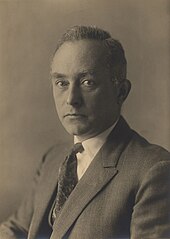Max Born Institute for Nonlinear Optics and Short Pulse Spectroscopy
| Max Born Institute for Nonlinear Optics and Short Pulse Spectroscopy | |
|---|---|
| Category: | Research institute |
| Carrier: | Research Association Berlin |
| Legal form of the carrier: | Registered association |
| Seat of the wearer: | Berlin |
| Membership: | Leibniz Association |
| Facility location: | Berlin-Adlershof |
| Type of research: | Basic research |
| Subjects: | Natural sciences |
| Areas of expertise: | Physics , optics |
| Basic funding: | Federal government (50%), states (50%) |
| Management: | Stefan Eisebitt Managing Director |
| Employee: | about 180 |
| Homepage: | www.mbi-berlin.de |
The Max Born Institute for Nonlinear Optics and Short Pulse Spectroscopy (MBI) is a research facility supported by the Forschungsverbund Berlin e. V. (FVB) and is a member of the Gottfried Wilhelm Leibniz Scientific Association (WGL). The institute is based in Berlin-Adlershof , its research activities are to be assigned to basic research in the natural sciences and the fields of physics and optics .
history
The institute emerged from parts of the “ Central Institute for Optics and Spectroscopy ” (ZOS) of the Academy of Sciences of the GDR . Based on a recommendation by the Science Council , the institute was re-established on January 1, 1992. The official opening took place on October 22, 1993.
The institute is named after the mathematician and physicist Max Born (1882–1970), who received the Nobel Prize in Physics in 1954 for his fundamental research in quantum mechanics and his lattice theory of crystals.
tasks
In accordance with its statutes, the MBI conducts basic research in the field of non-linear optics and short-term spectroscopy as well as the interaction of matter with laser light from infrared to the X-ray spectral range and pursues the resulting application aspects. Complementary studies such as the combined use of lasers with synchrotron radiation are intended to complement the scientific program.
The institute has three main focuses:
- Research and development of new sources for ultra-short and ultra-intensive laser pulses ;
- Interdisciplinary applications in basic research and in the run-up to future key technologies;
- Provision of laser systems, measurement technology and know-how for external users.
The MBI plays an important role in the development of laser sources for ultra-short and high-intensity light pulses and their application in research. It has developed its own high-power laser systems that are connected to the international top. With these high-power lasers as well as short-pulse lasers based on existing technology, experimental equipment is available to science and industrial users in Germany, which is accessible to external users in the application laboratories.
Cooperations
The MBI has signed three cooperation agreements with the Berlin universities Humboldt University , Free University and Technical University . Other contracts regulate the cooperation with the Berlin Electron Storage Ring Society for Synchrotron Radiation GmbH (BESSY, part of the Helmholtz Center Berlin for Materials and Energy since 2009 ), with the German Electron Synchrotron Foundation (DESY), Hamburg, the Physikalisch-Technische Bundesanstalt ( PTB), Berlin, Colorado State University as well as several companies and other research institutions.
Infrastructure
The MBI is managed by a board of directors, which consists of the three directors of the scientific areas and who were each appointed jointly with one of the three Berlin universities. The directors are Marc Vrakking, Stefan Eisebitt (managing director) and Thomas Elsässer (as of May 2018).
About 180 people work in the institute.
The total budget of the institute is 14.3 million euros, of which around 11 million euros were funded half by the federal government ( BMBF ) and half by the federal states.
The eight buildings of the MBI have a total usable area of 7,473 m² for offices and laboratories.
See also
Web links
- Homepage of the Max Born Institute for Nonlinear Optics and Short Pulse Spectroscopy
- Homepage of the Forschungsverbund Berlin eV
Individual evidence
- ↑ to homepage
Coordinates: 52 ° 25 ′ 50 ″ N , 13 ° 31 ′ 33 ″ E
